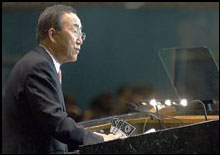In an act that has excited citizens and civil authorities around the world, the G-20 and the United Nations have simultaneously voted on a mutually binding resolution to mill the world’s bombs. These bombs, rather than being dropped or mailed or windmill slammed, will be ground into a fine powder that will be used in high-school science labs, novelty moustache-drawing devices and nutritional supplements for impoverished, iron-deficient children in the developing world.

“This is a proud moment for all us,” said U.N. Secretary General That Korean Guy Whose Name Nobody Knows. “To see these bombs put in a place where they can’t hurt anyone anymore – you have to admit; that’s a pretty great feeling.”
The milling condition goes into effect in 2015, and, at the behest of the permanent members of the security council, does not effect bombs that have already been produced, bombs currently in production, or any bombs designed and manufactured before the ban takes effect.
“This is an empty piece of self-congratulation that doesn’t affect the board,” said Netherlands U.N. delegate Franz Blarsten. “Unless it is changed to mill all the weapons in the world – starting immediately, and completing within the year – it will not affect the ability of the nations of the world to make war, either against each other or against their own citizens.” During Blarsten’s remarks, the lights were turned out, and all the other delegates went for sandwiches.
Libyan Leader Mu’ammar Al-Qadhafi was slated to speak in the opposition, but he instead launched into a 94-minute rant about the shuffler.